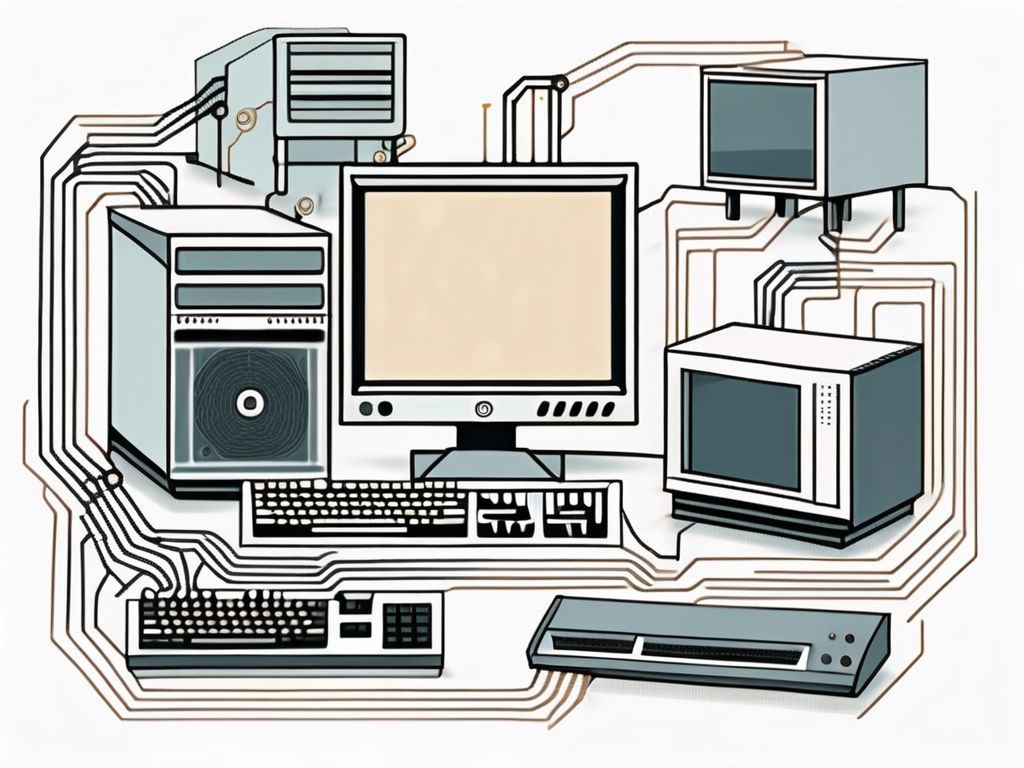The Ultimate Guide to Becoming a Systems Programmer
Systems programming is a specialized and challenging field that requires a deep understanding of computer systems and the ability to write low-level code. If you have a passion for coding and a desire to work on the inner workings of computers, then becoming a systems programmer might be the perfect career path for you. In this ultimate guide, we will explore the world of systems programming, including what it is, the skills required, the educational path to follow, and the different programming languages commonly used in this field. So, let's dive in!
Understanding Systems Programming
Before we delve into the details of becoming a systems programmer, it's crucial to have a clear understanding of what exactly systems programming entails.
Systems programming is a fascinating field that lies at the intersection of software and hardware, requiring a deep understanding of both realms. It involves developing software that directly communicates with and controls the intricate machinery of a computer system. This level of proximity to the hardware allows systems programmers to optimize performance and efficiency in ways that application programmers cannot.
Defining Systems Programming
Systems programming is a branch of computer programming that focuses on the development of software that operates and interacts directly with computer hardware. It involves writing code that directly controls and manages the resources of a computer system, such as memory, processors, and input/output devices.
Furthermore, systems programming often involves working on critical components of an operating system, device drivers, and embedded systems. This requires a meticulous attention to detail and a thorough understanding of how different layers of software interact with the underlying hardware.
The Role of a Systems Programmer
A systems programmer is responsible for designing, implementing, and maintaining the software that enables a computer system to function efficiently. They work closely with hardware engineers to optimize the performance of computer systems and develop software tools that facilitate system-level programming tasks.
Systems programmers play a crucial role in ensuring that the software running on a computer system is robust, secure, and efficient. They are often involved in performance tuning, memory management, and ensuring compatibility with different hardware configurations.
Key Skills Required for Systems Programming
Beyond a strong foundation in programming languages, systems programmers need a set of specialized skills to excel in their roles. Some essential skills for systems programmers include:
- Understanding of computer architecture
- Proficiency in low-level programming languages, such as assembly language and C
- Knowledge of operating systems and their internals
- Debugging and troubleshooting skills
- Experience with version control systems
Additionally, systems programmers must possess excellent problem-solving abilities, as they often encounter complex issues that require innovative solutions. They must be detail-oriented individuals who can work methodically to identify and resolve system-level problems efficiently.
The Path to Becoming a Systems Programmer
Now that you have a better understanding of what systems programming entails, let's explore the path to becoming a systems programmer.

Systems programming is a specialized field that requires a solid educational foundation. Most employers prefer candidates with a bachelor's degree in computer science, computer engineering, or a related field. These degree programs provide a comprehensive curriculum that covers essential topics such as computer architecture, operating systems, and programming languages like C and C++.
However, it's important to note that a degree is not the only way to break into systems programming. Many successful systems programmers have acquired the necessary skills through self-study and practical experience. In fact, some employers value hands-on experience and practical skills more than formal education. So, if you don't have a degree, don't be discouraged. There are still plenty of opportunities for you to pursue a career in systems programming.
Gaining Relevant Experience
While academic knowledge is essential, hands-on experience is equally crucial for systems programmers. Consider seeking internships or part-time positions that allow you to gain practical experience in system-level programming. These opportunities will not only provide you with valuable real-world experience but also allow you to build a network of professionals in the field.
Working on personal projects can also be an excellent way to showcase your skills to potential employers. Create your own system-level programs, experiment with different programming languages, and contribute to open-source projects. These activities will not only help you develop your technical skills but also demonstrate your passion and commitment to the field.
Certifications and Courses
While not always a requirement, certifications can demonstrate your expertise and dedication to potential employers or clients. Consider pursuing certifications like the Certified Systems Programmer (CSP) provided by [Certification Authority A]. These certifications validate your knowledge and skills in systems programming, making you a more competitive candidate in the job market.
Additionally, there are various online courses and tutorials available that can help you enhance your skills and stay up-to-date with the latest advancements in systems programming. These resources cover a wide range of topics, from advanced programming techniques to specific operating systems and hardware architectures. Taking advantage of these learning opportunities will not only expand your knowledge but also demonstrate your commitment to continuous learning and professional growth.
Exploring Different Systems Programming Languages
Systems programming involves working with different programming languages, each with its own set of features and benefits. Let's take a closer look at some commonly used languages in systems programming.

When delving into the realm of systems programming, it's essential to understand the nuances of various programming languages that cater to this domain. Each language brings its unique strengths and capabilities to the table, allowing developers to craft efficient and powerful software solutions that interact closely with hardware.
Overview of C and C++
C and C++ are popular choices for systems programming due to their low-level capabilities and direct access to hardware. They are known for their high performance and efficiency, making them ideal for developing software that interacts with computer systems at a deep level.
One of the key advantages of using C and C++ in systems programming is the level of control they offer to developers. With features like manual memory management and the ability to manipulate hardware directly, programmers can fine-tune their code for optimal performance and resource utilization.
The Role of Java in Systems Programming
While not as extensively used in systems programming as C or C++, Java still plays a role in certain domains. Java offers platform independence and a wealth of libraries, making it a suitable choice for developing software tools and applications that run on multiple operating systems.
Java's robust ecosystem and extensive standard library make it a versatile language for systems programming tasks that require cross-platform compatibility. Additionally, Java's garbage collection mechanism simplifies memory management, reducing the risk of memory leaks and other common programming errors.
Understanding Assembly Language
Assembly language is the lowest level of programming languages and is specific to a particular computer architecture. It provides direct access to the computer's native instructions, allowing systems programmers to optimize code for performance. Although rarely used in modern systems programming, understanding assembly language can greatly enhance your ability to write efficient code.
Delving into assembly language programming can offer a deep understanding of how computers execute instructions at the hardware level. By gaining insights into memory management, processor registers, and instruction sets, programmers can develop a profound appreciation for the inner workings of a computer system, paving the way for highly optimized and specialized software solutions.
Tools of the Trade for Systems Programmers
Systems programmers rely on a variety of tools to develop, debug, and manage their code. Let's explore some of the essential tools that every systems programmer should be familiar with.
Essential Software and Hardware
Systems programming often requires specialized hardware and software tools. These may include an integrated development environment (IDE) such as Visual Studio or Eclipse, a hardware debugger to analyze and test code, and emulators or simulators to replicate different computer architectures for testing purposes. It's important to familiarize yourself with these tools and understand how they can streamline your workflow.
For example, an IDE like Visual Studio provides a comprehensive set of features specifically designed for systems programming. It offers advanced debugging capabilities, code analysis tools, and a user-friendly interface that allows programmers to write, test, and optimize their code efficiently. Additionally, hardware debuggers like JTAG (Joint Test Action Group) allow programmers to examine the internal state of a microcontroller or processor, enabling them to identify and fix issues at a low level.
Debugging and Testing Tools
Debugging is a critical part of systems programming, as it helps identify and resolve issues in code. Familiarize yourself with debugging tools like gdb and memory profilers to track down and fix bugs efficiently. Additionally, testing frameworks such as JUnit or Google Test can help ensure the correctness and stability of your code.
Memory profilers, for instance, provide valuable insights into memory usage and allocation patterns, allowing programmers to optimize their code for better performance and efficiency. These tools can help identify memory leaks, excessive memory consumption, and other memory-related issues that can impact the overall performance of a system.
Version Control System
Version control systems are essential for managing code changes and collaborating with other team members. Git is a popular choice among systems programmers due to its distributed nature and powerful branching features. Understanding how to use version control systems effectively can greatly enhance your productivity and make collaboration seamless.
With Git, programmers can create branches to work on different features or bug fixes independently, without interfering with each other's code. This allows for parallel development and easy merging of changes. Moreover, Git provides a robust history of code changes, making it easier to track down issues and revert to previous versions if needed.
By leveraging the power of version control systems, systems programmers can work more efficiently, collaborate effectively, and ensure the integrity of their codebase.
As you can see, systems programming involves a wide range of tools that are essential for success in this field. From specialized hardware and software to debugging and testing tools, and version control systems, mastering these tools will empower you to develop robust and efficient systems. So, embrace the world of systems programming and dive into the fascinating realm of low-level coding!

